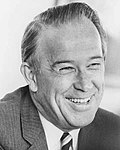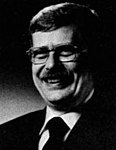The 1970 United States Senate election in Washington was held on November 3, 1970. The Democratic incumbent Henry M. Jackson won a fourth term in office with a landslide victory over Republican state senator Charles Elicker.
| |||||||||||||||||
| |||||||||||||||||
 County results Jackson: 60–70% 70–80% 80–90% >90% | |||||||||||||||||
| |||||||||||||||||
Blanket primary
editIn the Democratic Party primary, Henry M. Jackson, who had served in the United States Senate since 1953, faced criticism for his support of military spending and the Vietnam War. This position caused members of the national party involved in peace activism, including Eugene McCarthy, Allard K. Lowenstein, and John Kenneth Galbraith, to petition state politicians to challenge Jackson. They found Carl Maxey, the first African American in Eastern Washington to qualify as an attorney, who resigned his position as chair of the Washington Democratic Council, an anti-war organization, to run for office. Maxey had previously worked for Jackson on his Senate campaigns but he publicly opposed the Vietnam War, particularly in relation to the drafting of African Americans at disproportionate rates.[1]
In May 1970, Maxey won the endorsement of the King County Democratic Convention. During the same month, President Richard Nixon announced an escalation to the Vietnam War as American forces invaded Cambodia. This decision led to protests across the country and the shooting of four anti-war protests at Kent State University in Ohio. Two months later, at the state party convention held in Spokane, Washington, supporters of Maxey disturbed the speech given by Jackson. The opposition pushed Jackson to the center of his party and he frequently said, "I'm proud of the fact that during my term in the Senate I opposed both McCarthys", comparing Eugene McCarthy and Joe McCarthy.[1]
Jackson had support from state Republicans, who donated hundreds of thousands of dollars to his primary campaign. Montgomery Johnson, the state party chairman, and Governor Dan Evans had difficulty finding a Republican challenger as the national party, including Nixon, discouraged any strong opposition. They finally recruited state senator, Charles Elicker, who beat four other candidates to win the party nomination.[2] In the primary on September 15, 1970, Jackson won the Democratic nomination with 497,309 votes and sweeping every county in the state. Maxey won second place in the blanket primary, with 79,201 votes and Elicker came in third with 33,262 votes.[1] The other candidates were two Democrats, John "Hugo Frye" Patric and Clarice Privette, and four Republicans, R. J. "Bob" Odman, William H. Davis, Howard S. Reed and Bill Patrick.[3]
Results
edit| Party | Candidate | Votes | % | |
|---|---|---|---|---|
| Democratic | Henry M. Jackson (incumbent) | 497,309 | 73.18% | |
| Democratic | Carl Maxey | 79,201 | 11.65% | |
| Republican | Charles W. Elicker | 33,262 | 4.89% | |
| Republican | Howard S. Reed | 22,293 | 3.28% | |
| Republican | Robert J. "Big Bob" Odman | 14,856 | 2.19% | |
| Democratic | Paul Gumbell | 24,559 | 3.05% | |
| Republican | William H. Davis | 11,207 | 1.65% | |
| Republican | Bill Patrick | 7,976 | 1.17% | |
| Republican | John Patric | 7,267 | 1.07% | |
| Democratic | Clarice L.R. Privette | 6,240 | 0.92% | |
| Total votes | 679,611 | 100.00% | ||
General election
editJackson was announced as the winner on November 3, 1970, three minutes after polls closed on election night. He had set the previous Washington record in 1964, which he broke by receiving 82 percent to Elicker's 16 percent, with two third party candidates sharing the remainder of the vote.[2] The landslide victory prompted Elicker to say about his percentage, "I'm thinking of asking for a recount".[5]
Results
edit| Party | Candidate | Votes | % | ±% | |
|---|---|---|---|---|---|
| Democratic | Henry M. Jackson (incumbent) | 879,385 | 82.43% | 10.22 | |
| Republican | Charles W. Elicker | 170,790 | 16.01% | 11.78 | |
| Socialist Workers | Karl Bermann | 9,255 | 0.87% | N/A | |
| Buffalo | Edison Fink | 7,377 | 0.69% | N/A | |
| Total votes | 1,066,807 | 100.00% | |||
| Democratic hold | Swing | ||||
See also
editReferences
edit- ^ a b c Oldham, Kit (October 29, 2003). "Senator Henry Jackson overwhelmingly defeats peace candidate Carl Maxey in the Democratic primary on September 15, 1970". HistoryLink. Retrieved April 14, 2023.
- ^ a b Oldham, Kit; Tate, Cassandra (October 29, 2003). "Washington voters re-elect Senator Henry Jackson by a record margin, retain six of seven U.S. Representatives, and legalize abortion on November 3, 1970". HistoryLink. Retrieved April 14, 2023.
- ^ "Tuesday is Primary Election Day" (PDF). The Concrete Herald. September 9, 1970. Retrieved April 14, 2023.
- ^ "Elections Search Results - September 1970 Primary". Washington Secretary of State. Retrieved June 25, 2022.
- ^ Beers, Carole (August 18, 1995). "Charles W. Elicker, Who Made Quixotic Run For The U.S. Senate". The Seattle Times. Retrieved April 14, 2023.
- ^ "Statistics of the Presidential and Congressional Election of November 2, 1970" (PDF). U.S. Government Printing Office. Retrieved March 2, 2021.
Further reading
edit- Bone, Hugh A. (1971). "The 1970 Election in Washington". Western Political Quarterly. 24 (2): 350–361. doi:10.2307/446879. ISSN 0043-4078. JSTOR 446879.
- Fosdick, Dorothy, ed. (1987). Staying the course: Henry M. Jackson and national security. University of Washington Press. ISBN 9780295965017.
- Ognibene, Peter J. (1975). Scoop: the life and politics of Henry M. Jackson. Stein and Day. ISBN 9780812818840.
- Prochnau, William W.; Larsen, Richard W. (1972). A certain Democrat: Senator Henry M. Jackson; a political biography. Prentice-Hall. ISBN 9780131231580.

